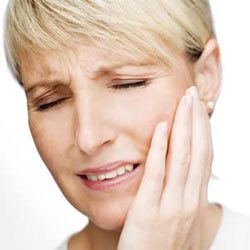Symptoms Of A Root Canal
Symptoms of a Root canal are things that you can FEEL when you are having problems with a tooth. ON THE OTHER HAND, in medical jargon, signs are the things that are visible to someone else, like your dentist or doctor. They might see a red or a swollen gum.
But root canal SYMPTOMS are what YOU feel when you might need root canal treatment.
The first thing people notice when a tooth starts to get a problem is SENSITIVITY to sweet or cold. This tells us that something is wrong, but usually it can be fixed quite easily at this early stage.
 An aching tooth
An aching toothWhat's the next symptom if I don't get the tooth fixed?
When a tooth gets sensitive to HEAT, then your dentist will start to worry a little. At this stage things are borderline.
HERE"S HOW TO TELL IF YOUR ROOT CANAL SYMPTOMS ARE SERIOUS:
IF it reacts to hot and cold equally, and the pain goes away within ten seconds or so, then there's a good chance that the tooth just needs a filling, or has some other problem that is reversible. It can be fixed. If you get the tooth looked by a dentist, and get the problem fixed, then it will PROBABLY settle down and be OK.
Symptoms Of A Root Canal
BUT if the tooth is painful when you have something hot to eat or drink, and it continues to ache for a while afterwards, then the tooth probably has Pulpitis. This is the dentists' word for inflammation of the nerve inside the tooth.
As the condition of the nerve inside the tooth continues to get worse, you may reach a stage where the sensitivity seems to have gone, at least at first. The tooth seems less sensitive to cold, maybe even not at all), and seems to tolerate hot food or drinks - while you are eating or drinking.
But then, after a hot drink, the tooth starts to ache. It can be a couple of minutes after you had the hot drink in your mouth, but more usually it's after about 30 to 60 seconds. Then the ache comes on, and it grows into a dull, gnawing pain that lasts an hour or so, unless you take some pain killers.
Pulpitis is usually caused by bacteria getting into the nerve due to tooth decay. Sometimes pulpitis develops without any bacteria, after a tooth takes a blow or a knock, for example in a cycling accident. Pain on heat that takes a while to settle down may mean that the nerve inside the tooth is dying. It cannot be reversed. It will continue to get worse. To save the tooth, it will need a root canal treatment.
Symptoms Of A Root Canal
The problem is, at this stage it can be difficult to pin down exactly which tooth is causing the problem. Although you will be having toothache, it may feel like it is coming from several teeth! Or from a different one to the REAL one.
I have experienced this myself twice, 15 years apart. Each time, a tooth needed root canal, but I was also getting pain from another tooth! I was shocked to feel pain in a tooth that I knew was healthy!
The first time it happened, I knew I had a very deep filling in a back molar. The tooth started to get a bit sensitive to hot and cold, so I had an X-ray to check it, and it showed that some decay had got in under the old filling.
So I had the filling replaced, and the dentist cleaned out the bit of decay that he could see there. But he was worried, because he could see that it was a very deep cavity, and very close to the nerve in the tooth.
At first, over the next few days, the tooth seemed better. But then it started to ache after I had my first cup of coffee in the morning. I took a few painkillers, and hoped it would settle down.
But later in the day, I felt my FRONT tooth aching, on the same side. I thought I was going crazy - the front tooth was perfectly healthy, and the BACK tooth was the one with the problem. Why was the front tooth aching? And it was really SORE!
This is what the medical profession calls "referred pain", where you feel the pain in a different part of the body from the area that actually has the problem. Your brain simply gets confused about where the pain is coming from, and you feel pain in a perfectly healthy area.
 Where's that pain coming from?
Where's that pain coming from?Symptoms Of A Root Canal
This is when your dentist has to do some detective work. He has to figure out which tooth really IS causing the pain. Sometimes it can be very difficult. Unfortunately, this is also the time when the pain can be the worst.
As the nerve continues to gradually get more inflamed, the tooth may become sore to bite on, or to tap on. This is due to the pulpitis spreading to the tooth root. At this stage, it becomes very clear which tooth is causing the problem. You can pinpoint it without any difficulty. The tooth is throbbing, anything hot makes it worse, and COLD MAKES IT BETTER for a short time.
SO, these are the classic root canal symptoms which tell us that a tooth needs root canal treatment;
- Toothache that is constant and throbbing.
- The pain is WORSE if you get something HOT on the tooth.
- You can reduce the pain if you put cold water (or anything cold) on the tooth.
- The tooth becomes very tender to bite on, or put any pressure on.
- After the nerve dies, the temperature sensitivity is gone, but the tooth is still painful to bite on.
Now the dentist can check all your symptoms of a root canal, and talk with you about the options you have. If you really do have an irreversible pulpitis, your only options are to have the tooth taken out, or else try to save it with a Root Canal Procedure.



